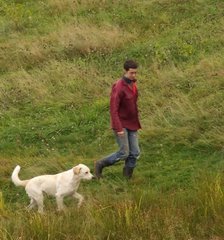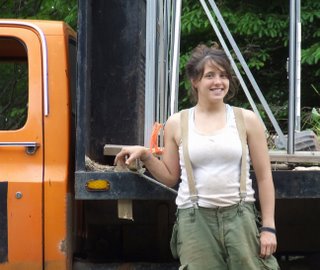

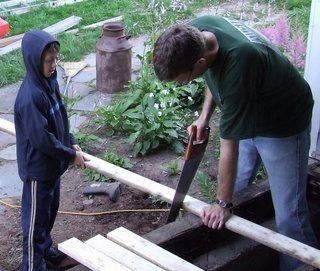

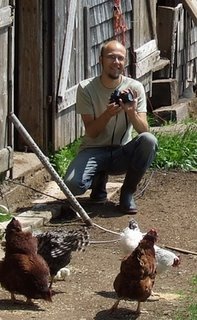
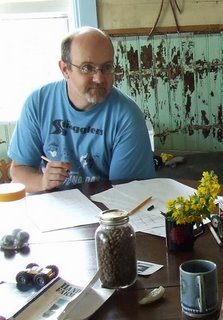
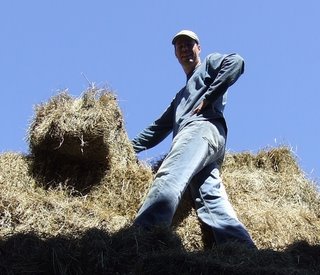
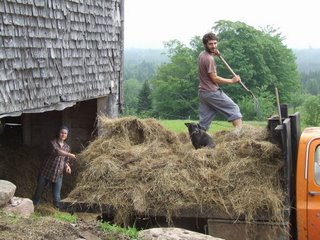
Farming, I'm discovering, has its own rhythms - cycles of energy dictated by the land and what grows out of it. The rhythm of the land becomes the rhythm of the farmer. As winter's chill settles into the bones of the land, my blood slows too. The air I breathe is quiet, expectant, laden with the inbreath of creatures asleep beneath the snow. Winter has become this place of pause, a space between inhale and exhale, a time to reflect on what has come into our lives and to imagine what is yet to come.
I want to post soon about Old Man Farm and where it is taking us. But before I can do that, I need to acknowledge some of the incredible people who have helped us evolve to this point. Since June of last year, we have been priveleged to host and to be helped by eleven individuals whose talents and insights have helped us grow. These folks came to us as WWOOFers - Willing Workers on Organic Farms - volunteering their energy in exchange for room, board, and whatever experiences we could share with them.
So, how have WWOOFers helped us? On a practical level, WWOOFers contribute muscle power, and help us get the job done. Keira's impressive muscles moved a greenhouse frame, turned sod, moved wood, planted strawberries - and pulled three children up a grassy hill on a toboggan! Katie and Michael moved truckloads of old hay and manure from the barn to the garden, hauled old barbed wire out of the pasture, and shoveled out the hen house. Ashley applied his muscles to the tasks of limbing trees, loading hay, and mulching, while Kai weed-wacked, mulched, and planted spuds. Bryan, Julie, and Matthew - our intrepid family of WWOOFers - pounded the spikes out of recycled railway ties, weeded the garden, and stacked hardwood stakes. Arjen loaded endless hay bales, hilled potatoes, and pulled weeds. Chrissie built up her forearm muscles by taking over the milking during her stay, and also dug out a spring, set up the greenhouse, and cleaned out the animal stalls. Kristin - who WWOOFed with us after the garden was finished for the year - helped us prepare for winter by loading and stacking tons of firewood, and mulching the strawberries.
In addition to sheer physical effort, WWOOFers have delighted us with their ingenuity and creativity, and helped us solve a wide array of problems. Keira's organizational efforts made the barn shop a much less cluttered place. Michael and Katie set up a new pea-staking system, and designed and built our very first "chicken tractor." Ashley contributed his formal design training and left us with the plans for a new hen house (the building of which may be a job for WWOOFers to come!), and Ashley and Kai worked together to create a stylish, recycled-wood chalet for the broiler chicks. Kai used GPS to note the position of various trees in our woodlot. Bryan, Julie, and Matthew helped us sort through, color-code, and store every last one of our zillion tools (most of which are still in more-or-less the right locations), and Bryan penned the official song of Old Man Farm: "Not for Human Consumption." Arjen and Kristin both displayed a knack for pitching in at just the right time in a variety of projects, and Chrissie applied her artistic hand to creating a detailed map of the newly-planted orchard.
I'm only mentioning the highlights of what each volunteer accomplished, by the way. And when you consider that the average length of stay for WWOOFers has been about ten days, you have to be impressed with their contributions!
But the physical work is only half of the story. Equally (if not more) important have been the conversations, suggestions, and insights WWOOFers have shared with us. All eleven of these people have allowed us a glimpse into their unique life-paths, generously adding their emotional and spiritual energy to what we are trying to create. Although WWOOFers ostensibly come here to learn, every one of them has left us with lessons as well.
Keira's boundless enthusiasm and genuine delight in everyday tasks reminded us that, in any situation, it is possible to choose optimism. Michael and Katie brought gentle spirits, quiet joy in simple pleasures, and an enviable ability to work peaceably together. Ashley - whose dogged attempt to find a new way of living brought him into unfamiliar and sometimes unpleasant territory - showed us that change is possible. Kai's kindness and easy-going nature made the work seem easier. Bryan's eagerness, his ready friendship, and his earnest pursuit of "the good" renewed our faith (on many levels), while his music lightened our spirits. Julie fit into our household like a sister, sharing the child-minding and household tasks, and helping to keep things flowing smoothly. Her practical and compassionate approach to faith were an inspiration. Matthew impressed us with his patience (a single child plunged into the deep waters of temporary sibling-hood!), his sense of comedy, and his peaceful nature. Arjen's openness, and his willingness to jump right in with both feet, made him good company. Chrissie's organized mind and direct approach gave us a helpful lens through which to evaluate our plans. And Kristin (the only WWOOFer whose picture we did not get, regrettably), shared a beautifully open, non-judgmental mind, and an exceptional ability to communicate clearly and honestly.
To all of the WWWOFers of 2006: Thank you for the hard work, the sharing of good food, the honest feedback, the interesting ideas, the fun and silliness, the connecting with our children, the insights and suggestions, the music, the support, and the encouragement. We could not have done it without you!





